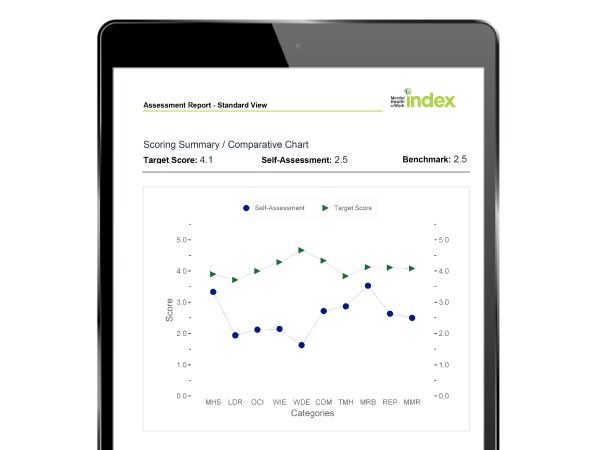 Despite, or maybe because, COVID is receding, and people are going back to the office, mental health among employees is actually getting worse: more than half of workers are saying they feel burned out, a 9% increase from a survey taken pre-COVID.
Despite, or maybe because, COVID is receding, and people are going back to the office, mental health among employees is actually getting worse: more than half of workers are saying they feel burned out, a 9% increase from a survey taken pre-COVID.
Having unhealthy employees, either mentally or physically, is bad for business; it can lead to increased absenteeism, negative impact on productivity and profits, an increase in costs, and decreased employee morale. And while most employers feel like they are already doing enough to help, their employees don’t agree.
One way to bridge that gap, and to make sure that the programs that employers are offering are actually working, is to create a standardized assessment, which is exactly what the Mental Health at Work Index, announced on Tuesday, will do.
The program, which was developed in a partnership between mental health non-profit One Mind at Work, Columbia University Mental Health + Work Design Lab, and corporate ethical standards measurement company Ethisphere, will help employers both design, and then assess, these programs based on what it calls the “Three Ps Framework,” which stands for protection, promotion and provision of care.
As stated on the program’s website, protect part means “eliminating psychosocial hazards and minimizing risks that can negatively affect workers’ mental health & psychological well-being,” while the promotion aspect involves, “developing the positive aspects of work as well as worker strengths and positive capacities.” Finally, the provision of care means providing access to information, resources, and services, as well as taking action to address workplace mental health needs regardless of cause.
The Index offers three different levels of engagement, all of which are designed to help organizations measure and improve their workforce mental health programs: Self-Assessment; Self-Assessment with Expert Consultation; and Independent Evaluation & Rapid Improvement Program.
The index will make assessments across 10 categories: mental health strategy, leadership, workforce engagement, communication, organizational culture, mental health training, work environment, mental health benefits, employment practices, and monitoring and reporting.
The program is launching with nine organizations that make up its Founding Corporate Council: AXA, Asia & Africa; Aon; Bank of America; Business Group on Health; HCA Healthcare; MINDSET Care Limited; MINDSET Limited; LifeWorks; Prudential; and URAC.
The plan is to make Mental Health at Work Index available in early 2023 following its current beta testing phase.
“The data don’t lie. Mental health is impacting the workforce at every company and ignoring it is not an option. The Mental Health at Work Index is designed to empower leaders who recognize the needs of their workforce and are ready to step up on this critical issue,” Dr. Kathleen M. Pike, Director of the Columbia University Mental Health + Work Design Lab said in a statement.
“By partnering with One Mind and Ethisphere, we are tapping into a reservoir of expertise, creating evidence-based solutions to help leaders drive data-informed strategies that translate into better health and greater productivity for workers, while also shoring up recruitment and retention of talent.”
Employees need more
A survey from the Recovery Village, taken in May 2021, found 87% of workers experiencing mental health symptoms, up more than 10 percentage points from 74% who said the same just six months earlier. It also found 80% reporting feelings of anxiety/nervousness, 68% reporting feeling stressed, 67% reporting depression or loneliness, 64% reporting sleep issues, and 42% reporting anger or agitation, all of which had increased from January.
There’s a disconnect between employers and their employees, though: 85% of employers feel they actively listen to the needs of employees, and that 81% employees believe they invest enough in the mental health of their employees, while 85% of employers said their employees felt seen.
However, only 51% of employees said they felt like their employers actively listen to their needs, and 46% believe their company invests enough in their mental health. Just 59% of employees reported feeling seen by their company and colleagues for their unique contributions to work.
The survey also found that company leaders are not doing what Lynch is advising them to do by being open about their own struggles, as 80% feel like they are expressing their own vulnerability when it comes to mental health, but only 30% of employees agreed with that.
The most troubling number in the report is that 72% of employers fear that focusing on mental health could have a reverse ROI effect, meaning that employees will work fewer hours in order to care for their mental health, rather than seeing that as a net benefit when it comes to workplace productivity.
(Image source: mentalhealthindex.org)
















